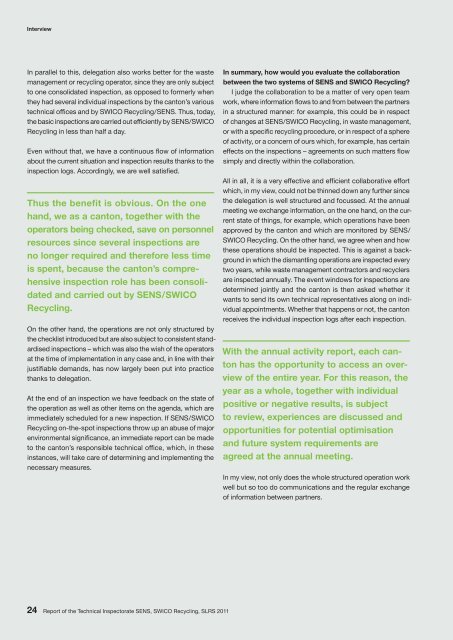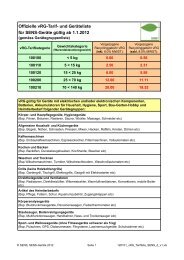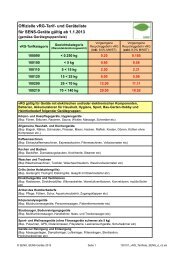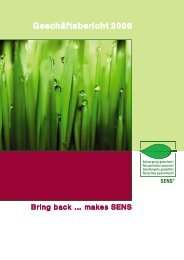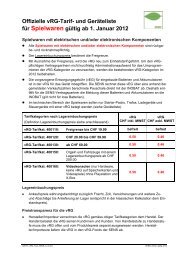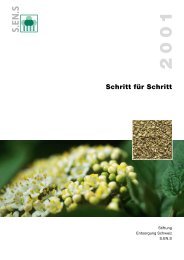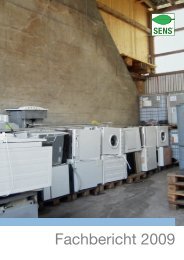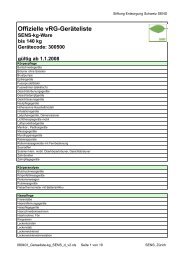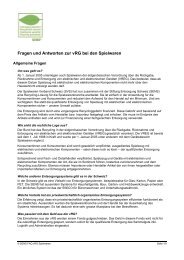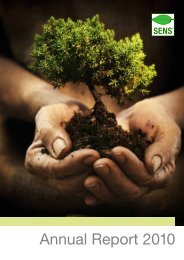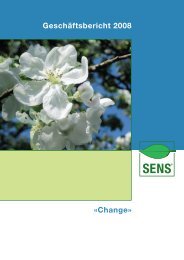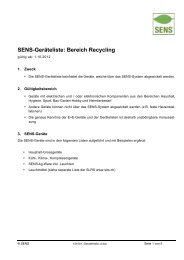Report of the Technical Inspectorate SENS, SWICO Recycling, SLRS
Report of the Technical Inspectorate SENS, SWICO Recycling, SLRS
Report of the Technical Inspectorate SENS, SWICO Recycling, SLRS
You also want an ePaper? Increase the reach of your titles
YUMPU automatically turns print PDFs into web optimized ePapers that Google loves.
Interview<br />
In parallel to this, delegation also works better for <strong>the</strong> waste<br />
management or recycling operator, since <strong>the</strong>y are only subject<br />
to one consolidated inspection, as opposed to formerly when<br />
<strong>the</strong>y had several individual inspections by <strong>the</strong> canton’s various<br />
technical <strong>of</strong>fices and by <strong>SWICO</strong> <strong>Recycling</strong> / <strong>SENS</strong>. Thus, today,<br />
<strong>the</strong> basic inspections are carried out efficiently by <strong>SENS</strong> / <strong>SWICO</strong><br />
<strong>Recycling</strong> in less than half a day.<br />
Even without that, we have a continuous flow <strong>of</strong> information<br />
about <strong>the</strong> current situation and inspection results thanks to <strong>the</strong><br />
inspection logs. Accordingly, we are well satisfied.<br />
Thus <strong>the</strong> benefit is obvious. On <strong>the</strong> one<br />
hand, we as a canton, toge<strong>the</strong>r with <strong>the</strong><br />
operators being checked, save on personnel<br />
resources since several inspections are<br />
no longer required and <strong>the</strong>refore less time<br />
is spent, because <strong>the</strong> canton’s comprehensive<br />
inspection role has been consolidated<br />
and carried out by <strong>SENS</strong> / <strong>SWICO</strong><br />
<strong>Recycling</strong>.<br />
On <strong>the</strong> o<strong>the</strong>r hand, <strong>the</strong> operations are not only structured by<br />
<strong>the</strong> checklist introduced but are also subject to consistent standardised<br />
inspections – which was also <strong>the</strong> wish <strong>of</strong> <strong>the</strong> operators<br />
at <strong>the</strong> time <strong>of</strong> implementation in any case and, in line with <strong>the</strong>ir<br />
justifiable demands, has now largely been put into practice<br />
thanks to delegation.<br />
At <strong>the</strong> end <strong>of</strong> an inspection we have feedback on <strong>the</strong> state <strong>of</strong><br />
<strong>the</strong> operation as well as o<strong>the</strong>r items on <strong>the</strong> agenda, which are<br />
immediately scheduled for a new inspection. If <strong>SENS</strong> / <strong>SWICO</strong><br />
<strong>Recycling</strong> on-<strong>the</strong>-spot inspections throw up an abuse <strong>of</strong> major<br />
environmental significance, an immediate report can be made<br />
to <strong>the</strong> canton’s responsible technical <strong>of</strong>fice, which, in <strong>the</strong>se<br />
instances, will take care <strong>of</strong> determining and implementing <strong>the</strong><br />
necessary measures.<br />
24 <strong>Report</strong> <strong>of</strong> <strong>the</strong> <strong>Technical</strong> <strong>Inspectorate</strong> <strong>SENS</strong>, <strong>SWICO</strong> <strong>Recycling</strong>, <strong>SLRS</strong> 2011<br />
In summary, how would you evaluate <strong>the</strong> collaboration<br />
between <strong>the</strong> two systems <strong>of</strong> <strong>SENS</strong> and <strong>SWICO</strong> <strong>Recycling</strong>?<br />
I judge <strong>the</strong> collaboration to be a matter <strong>of</strong> very open team<br />
work, where information flows to and from between <strong>the</strong> partners<br />
in a structured manner: for example, this could be in respect<br />
<strong>of</strong> changes at <strong>SENS</strong> / <strong>SWICO</strong> <strong>Recycling</strong>, in waste management,<br />
or with a specific recycling procedure, or in respect <strong>of</strong> a sphere<br />
<strong>of</strong> activity, or a concern <strong>of</strong> ours which, for example, has certain<br />
effects on <strong>the</strong> inspections – agreements on such matters flow<br />
simply and directly within <strong>the</strong> collaboration.<br />
All in all, it is a very effective and efficient collaborative effort<br />
which, in my view, could not be thinned down any fur<strong>the</strong>r since<br />
<strong>the</strong> delegation is well structured and focussed. At <strong>the</strong> annual<br />
meeting we exchange information, on <strong>the</strong> one hand, on <strong>the</strong> current<br />
state <strong>of</strong> things, for example, which operations have been<br />
approved by <strong>the</strong> canton and which are monitored by <strong>SENS</strong> /<br />
<strong>SWICO</strong> <strong>Recycling</strong>. On <strong>the</strong> o<strong>the</strong>r hand, we agree when and how<br />
<strong>the</strong>se operations should be inspected. This is against a background<br />
in which <strong>the</strong> dismantling operations are inspected every<br />
two years, while waste management contractors and recyclers<br />
are inspected annually. The event windows for inspections are<br />
determined jointly and <strong>the</strong> canton is <strong>the</strong>n asked whe<strong>the</strong>r it<br />
wants to send its own technical representatives along on individual<br />
appointments. Whe<strong>the</strong>r that happens or not, <strong>the</strong> canton<br />
receives <strong>the</strong> individual inspection logs after each inspection.<br />
With <strong>the</strong> annual activity report, each canton<br />
has <strong>the</strong> opportunity to access an overview<br />
<strong>of</strong> <strong>the</strong> entire year. For this reason, <strong>the</strong><br />
year as a whole, toge<strong>the</strong>r with individual<br />
positive or negative results, is subject<br />
to review, experiences are discussed and<br />
opportunities for potential optimisation<br />
and future system requirements are<br />
agreed at <strong>the</strong> annual meeting.<br />
In my view, not only does <strong>the</strong> whole structured operation work<br />
well but so too do communications and <strong>the</strong> regular exchange<br />
<strong>of</strong> information between partners.


